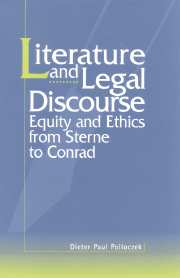Book contents
- Frontmatter
- Contents
- Preface
- Chapter 1 Introduction
- Chapter 2 Trappings of a transnational gaze: legal and sentimental confinement in Sterne's novels
- Chapter 3 Reinstitutionalizing the common law: Bentham on the security and flexibility of legal rules
- Chapter 4 Aporias of retribution and questions of responsibility: the legacy of incarceration in Dickens's Bleak House
- Chapter 5 A curse gone re-cursive: the case and cause of solidarity in Conrad's The Nigger of the “narcissus”
- Chapter 6 Conclusion
- Notes
- Index
Chapter 5 - A curse gone re-cursive: the case and cause of solidarity in Conrad's The Nigger of the “narcissus”
Published online by Cambridge University Press: 22 September 2009
- Frontmatter
- Contents
- Preface
- Chapter 1 Introduction
- Chapter 2 Trappings of a transnational gaze: legal and sentimental confinement in Sterne's novels
- Chapter 3 Reinstitutionalizing the common law: Bentham on the security and flexibility of legal rules
- Chapter 4 Aporias of retribution and questions of responsibility: the legacy of incarceration in Dickens's Bleak House
- Chapter 5 A curse gone re-cursive: the case and cause of solidarity in Conrad's The Nigger of the “narcissus”
- Chapter 6 Conclusion
- Notes
- Index
Summary
For what can more partake of the mysterious than an antipathy spontaneous and profound, such as is evoked in certain exceptional mortals by the mere aspect of some other mortal however harmless he may be, if not called forth by this harmlessness?[…] Coke and Blackstone hardly shed so much light into obscure spiritual places as the Hebrew prophets. And who were they? Mostly recluses.
Melville, “Billy Budd”DISTRIBUTING COMPENSATORY JUSTICE AND JUSTIFYING THE DISTRIBUTION OF RISK
Like Dickens, Conrad explores the contexts in which the law's exemplary economy of norms and precedents may become paradoxical. In similar fashion, he channels this kind of excess towards the question of alternative internal standards for delinquency. Both Dickens and Conrad raise the question of excess in terms of the question as to how much the internalization of guilt in self-imposed isolation is indebted to the very legal assumptions about personality that causes conscience to operate. This question of guilt-as-indebtedness reflects an affinity, unintended by many of their characters, between the renunciation of norms or customs and the alienation from intimacy and social bonds.
Like Dickens, Conrad is concerned to question Bentham's attempt to anchor the calculus of pleasure and pain in a more or less self-regulating circuit of suffering and compensation - the utility principle. In similar ways, he variously suggests this concern throughout his early work: the postutilitarian idea of commensurating pain with its cure is already present in those philanthropic doctrines which advocate character formation as an anticipated compensation for suffering.
- Type
- Chapter
- Information
- Literature and Legal DiscourseEquity and Ethics from Sterne to Conrad, pp. 203 - 242Publisher: Cambridge University PressPrint publication year: 1999



